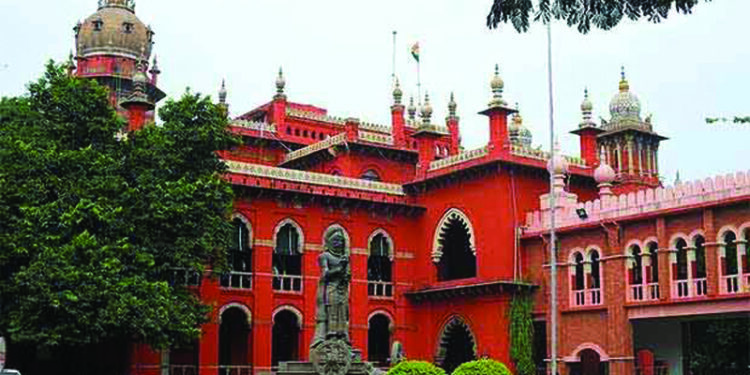NE NEWS SERVICE
NEW DELHI, NOV 2
The Supreme Court on Monday was informed that a three-judge committee of the Madras High Court has questioned the constitutional validity of special courts for MPs and MLAs constituted pursuant to the top court’s orders for fast tracking cases against lawmakers.
The three-judge criminal rules committee of the High Court has said special courts (directed to be setup for the first time in 2017) can only be “offence centric” and not “offender centric” and can be constituted only be statute and not by “judicial or executive fiats”.
The committee in its report sent to senior advocate Vijay Hansaria, appointed as amicus curiae in the matter by the top court, said though the Supreme Court was very guarded in its orders passed on the issue, it “fell in error by creating special courts” for trial of criminal cases involving lawmakers.
The High Court’s committee said the top court adopted the format of the government order that was passed by Telangana. It said “the fallacy” in the government order creating special courts for MPs/MLAs is that it erroneously traces the source of power to the Supreme Court order of November 1, 2017 passed in a case filed by Ashwini Kumar Upadhyay and not to any statute.
It said the existing court structure in Tamil Nadu, which is robust, is more than enough to deal with the cases involving MPs and MLAs and requested the Madras High Court chief justice “to bring this fact to the notice of the Supreme Court and get exemption from establishing Special Courts for trial of cases involving MPs and MLAs and permit restoration of status quo ante”.
The high court’s committee said, “the constitution of the special courts for MP/MLAs cannot be sustained on the judicial side in the light of the authoritative pronouncement of the Supreme Court” and referred to three verdicts of the top court.
The objections raised by the Madras High Court committee were brought before the court by Hansaria and advocate Sneha Kalita assisting him, through their 80-page report filed on Monday.
The matter is likely to be taken up for hearing on Wednesday by a Supreme Court bench headed by Justice N V Ramana.
The High Court committee referred to several difficulties in setting up these courts and said in case of Tamil Nadu, by sending the case from Kanyakumari district to the special MP/MLA court in Chennai, the witnesses from Kanyakumari were required to travel 700 kilometers for giving evidence and none thought about their safety. It said, “The two principal political parties namely DMK and ADMK, whenever they come to power, file defamation cases against opposition leaders in the court of sessions. These cases will invariably by stayed by the High Court. When there is change in government, all the cases filed by the previous government will be withdrawn”.
The committee further said Special Courts for Members of Parliament and Legislative Assemblies (MPs and MLAs) created by virtue of a government order cannot oust the jurisdiction of the Special Court constituted under the enactment.
Hansaria countered the objections raised by the three-judge committee of Madras High Court and referred to the provisions of CrPC and to various top court verdicts including constitution bench judgements upholding setting up of special courts.
“It is thus submitted that the ratio of Anwar Ali case (1952 verdict) and the subsequent judgments following the same did not lay down that ‘offender centric’ classification is per se unconstitutional and hit by Article 14, and that the classification can only be ‘offence centric’,” he said in his report.
The senior advocate further said the apex court has directed expeditious trial of criminal cases against MPs/ MLAs by designating special courts in view of the fact that offenders are or have been legislators, who constitute a class in themselves, and speedy trial of such cases is in public interest.
“The legislators are lawmakers who lay down policies for socio-economic development of the country and are responsible for upholding constitutional morality. It is on record that a large number of cases, including heinous offences, are pending in the courts not only for years but for decades,” he said.
Hansaria added that a special mechanism for speedy trial of these cases cannot be flawed and no special procedure less advantageous to the accused persons has been prescribed for trial of cases involving MPs/ MLAs. These cases are tried as per general procedure prescribed under CrPC.
“The conclusion drawn by the Criminal Rules Committee of the High Court that the designation of Special Courts MP/ MLA is unconstitutional as Special courts can only be ‘offence centric’ and can never be ‘offender centric’, with all humility, is not correct. It is also incorrect that Special Courts can never be constituted by judicial order,” he said.
Hansaria submitted that the MPs/ MLAs constitute a class in themselves and thus Special Courts can be constituted for expeditious trial of criminal cases against MPs/ MLAs, which is in public interest.
“Thus, Special Courts MP/ MLA designated by issue of a notification by State Governments after consultation with the High Courts is constitutionally valid,” his report said.
The top court was earlier apprised that the total number of cases against sitting and former lawmakers as per the latest reports are 4,859 while the total number of cases as per earlier reports filed in March 2020 were 4,442.












